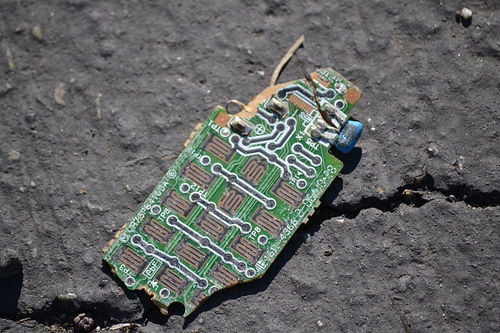The Pennsylvania Department of Environmental Protection issued a notice yesterday advising consumers and businesses to get prepared for the new electronics recycling law which will take effect on Jan. 24, 2013. The Pennsylvania Covered Device Recycling Act, enacted in 2010, requires that consumers cannot dispose of certain electronics devices in the trash, but that these items must instead be brought to a recycling operation.
“Proper recycling is important because there are millions and millions of devices; they have a limited useful life span; and they contain heavy metals such as lead, cadmium and mercury as well as other materials that do not belong in the normal trash stream,” DEP Secretary Mike Krancer said.
Electronic waste, that is discarded computers, cell phones, televisions, or other gizmos built out of modern electronics wizardry, contain reams of toxic and/or valuable materials. Some of the materials in electronic waste (e-waste) include Americium, a radioactive source used in smoke alarms; Mercury, used in fluorescent lights and many other electronics gizmos; BFR‘s, used as flame retardants in plastics and known to cause problems in the nervous system or thyroid gland; Cadmium, used in a wide variety of electric components, and known to cause lung or kidney damage; and many more.
Many devices also contain valuable materials such as the rare earth elements, gold, silver, copper, aluminum, and more.
The law also implements a form of Producer Responsibility, by requiring manufacturers to “provide for the collection, transportation and recycling of these devices by establishing one-day events, permanent collection programs or mail-back programs.”
When looking for an electronics waste recycling program, consider where the e-waste is sent. In many cases e-waste is sent to developing countries that lack environmental and worker safety protection. The e-waste is then processed in the worst way possible resulting in toxic waste dumps and sick workers. The materials in e-waste can be processed in ways which protect the environment and worker health.
Electronics recycling can reduce the mining of “virgin” materials from mines.
Recycling information is available from County Recycling Coordinators, and all relevant information is on the Department of Environmental Protection website (www.dep.state.pa.us![]() ), look for the keyword “Electronics Recycling”.
), look for the keyword “Electronics Recycling”.
Image source: http://en.wikipedia.org/wiki/File:Brokencircuitboard2011.jpg![]() (creative commons)
(creative commons)
- The USA should delete Musk from power, Instead of deleting whole agencies as he demands - February 14, 2025
- Elon Musk, fiduciary duties, his six companies PLUS his political activities - February 10, 2025
- Is there enough Grid Capacity for Hydrogen Fuel Cell or Battery Electric cars? - April 23, 2023
- Is Tesla finagling to grab federal NEVI dollars for Supercharger network? - November 15, 2022
- Tesla announces the North American Charging Standard charging connector - November 11, 2022
- Lightning Motorcycles adopts Silicon battery, 5 minute charge time gives 135 miles range - November 9, 2022
- Tesla Autopilot under US Dept of Transportation scrutiny - June 13, 2022
- Spectacular CNG bus fire misrepresented as EV bus fire - April 21, 2022
- Moldova, Ukraine, Georgia, Russia, and the European Energy Crisis - December 21, 2021
- Li-Bridge leading the USA across lithium battery chasm - October 29, 2021










